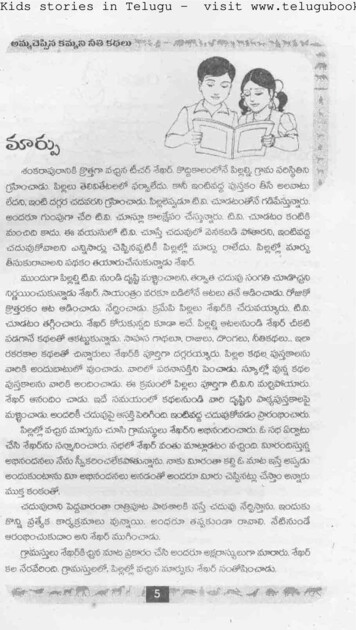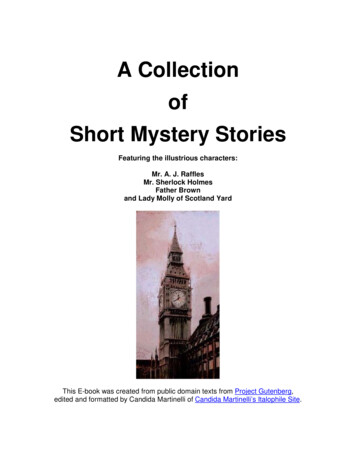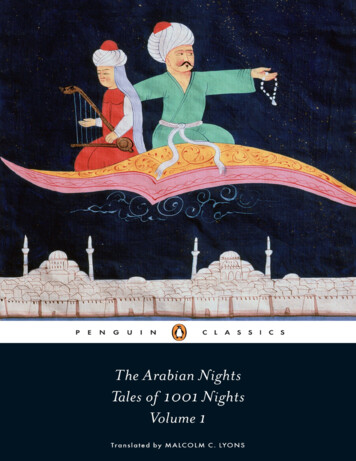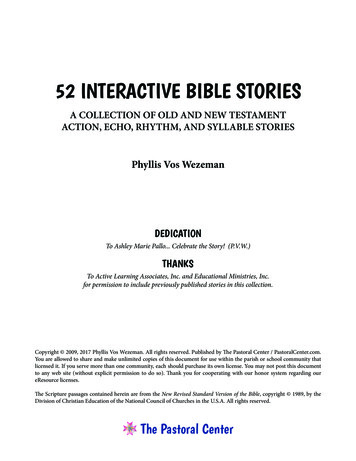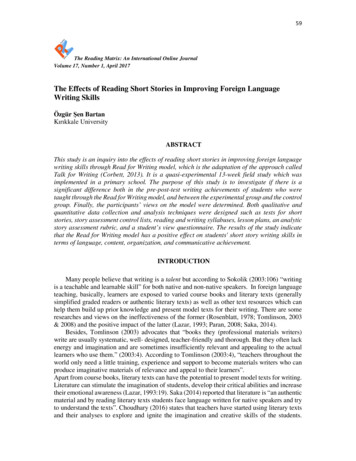
Transcription
BEST SHORTSTORIES OFW. SOMERSETMAUGHAM Introduced byned halleyCo e or’s LıBrarY3Somerset Maugham 1-416316/3/11, 9:53 am
Contentsintroduction7biography17further reading18The Letter21The Verger67The Vessel of Wrath77The Book-Bag129The Round Dozen179The Facts of Life215Lord Mountdrago241The Colonel’s Lady273The Treasure299Rain321P&O3755Somerset Maugham 1-416515/4/11, 2:00 pm
IntroductionSomerset Maugham’s short stories are among themost accessible in all English literature. They arewonderfully easy to read. Maugham addresses thereader with a candour entirely his own. He is matterof-fact in his depiction of character, direct in hishandling of narrative. He does not play tricks orcontrive surprise outcomes. But his people and hisplots are nonetheless powerfully compelling. Thelack of embellishment heightens both tension andcredibility.No other writer comes close to Maugham in thisrespect. How did he do it? A great part of the secrethas to be his own life, which was long and extremelyeventful. He harvested the experiences of his travelsand acquaintanceships, his triumphs and his sorrows,with ruthless determination. Even though he was arguably the most celebrated, and certainly the best paid,writer of his day, he did not consider himself a seriouscreative force. ‘I have small power of imagination,’ heconfessed, ‘but an acute power of observation.’William Somerset Maugham, always known in hiscircle as Willie, was born in Paris on 24 January 1874.His father, Robert Ormond Maugham, belonged to afamily with a long pedigree in the legal profession andwas the lawyer for the British Embassy. William wasa late baby whose three elder brothers had alreadybeen sent away to English boarding schools, so hisearly upbringing was in effect that of an only child.But the happy years were ended by the death of7Somerset Maugham 1-416716/3/11, 9:53 am
w. somerset maughamhis adored, artistic and socially accomplished motherEdith from tuberculosis, aged just forty-one, a weekafter the boy’s eighth birthday. Two years later, hisfather succumbed to cancer.Willie, who knew little of England and had Frenchas his first language, was sent to live at the home ofhis late father’s younger brother, Henry Maugham,the Vicar of Whitstable on the Kent coast. HenryMaugham and his German-born wife Sophie werechildless, but seem not to have welcomed their newcharge with any enthusiasm. The boy was promptlysent, as a boarder, to the King’s School in Canterbury, just a few miles distant.By his own account, Willie had a wretched time ofit. He was below average height and to begin withspoke rather broken English. He was mocked onboth accounts. He seems to have won little sympathyfrom his uncle, whose Christian calling did not inhibithis glacial snobbery and detachment. Sophie, downtrodden, ailing and homesick, proved no substitutefor Willie’s mourned mother (whose photograph hekept by his bed from this time and for all of his life)and he developed a disabling stammer which he neverentirely shook off.But such melancholic childhoods can translateinto lives of energy and creativity. Willie endured theschool until 1889, and after his sixteenth birthdayin January of the following year refused to return.Abetted by Sophie, he was allowed to continue hiseducation in Germany, at the esteemed and cosmopolitan university of Heidelberg, where he studiedthe German language and its literature, and foundlove.His inamorato was John Ellingham Brooks, a8Somerset Maugham 1-416816/3/11, 9:53 am
introductionCambridge-educated lawyer, talented musician,impecunious aesthete and conspicuous homosexual.Ten years older than Maugham, he introduced himnot only to the love that dares not speak its name,but to the philosophical writings of figures such asDutch theologian Spinoza and German pessimistSchopenhauer. Above all, Brooks encouraged hisprotégé to write. Maugham needed no second asking,and within the year had completed his first book,a biography of the German composer GiacomoMeyerbeer (1791–1864), a pioneer of grand operawhose reputation had been maliciously ruined by ajealous Richard Wagner.Maugham and Brooks were to remain long-termfriends, but after just a year at Heidelberg, the aspiringyoung writer was recalled to England. His uncle wasanxious he should find a profession, but concededWillie might not be as suited to the law as so manyother Maughams had proved (one brother, laterViscount Maugham, rose to the Lord Chancellorship)and was content when, after a very short dalliancewith accountancy, Willie enrolled at St Thomas’sHospital in Lambeth as a medical student. It is atestament to his forbearance and intellect that hestayed the five-year course. All along, in tandem withhis medical studies, he observed and noted thecharacter and circumstances of the patients, manyin desperate straits, in his care. In 1897, he qualifiedas a doctor and published his first novel, Liza ofLambeth, a gritty tragedy of working-class lives andloves in the impoverished London borough. It drewunreservedly on the author’s own experiences.The book amply illustrated the powers of observationand ear for dialogue that were to be Maugham’s9Somerset Maugham 1-416916/3/11, 9:53 am
w. somerset maughamhallmarks, and it sold strongly following favourablereviews. The handsome young doctor, writing withstark and spare realism – and plenty of drama – onthemes of adultery and domestic violence set againstthe background of Queen Victoria’s golden jubilee,became as famous overnight as he might very wellhave anticipated.He quit medicine for ever, and set off for Sevillein Spain to begin the writer’s life he had so longimagined for himself. As a member of a homosexualmilieu, he considered the Continent a far safer placefor him. He was well aware that Oscar Wilde,sensationally convicted for sodomy in a British courttwo years earlier, had fled to France. But unlikeWilde, who died in miserable exile in 1900, Maughamwas at liberty to come and go between his own homein London and those he subsequently rented in Spain,on Capri in southern Italy, and on the French Riviera.He wrote assiduously through the years leading up tothe First World War, producing ten novels, at leastas many plays, and a growing canon of short stories.He needed patience, because it was not until thesudden success of a 1907 play, Lady Frederick, thathe repeated the éclat of Liza of Lambeth. Within ayear, he had three more plays – all previously rejectedby London managements – running in the West End.This is what made him famous as a writer in everygenre. He suddenly became a major figure in literaryand social circles.Maugham is now largely forgotten as a playwright,but his novel of 1915, Of Human Bondage, immortalised him as a writer of fiction. This great work,with its title borrowed from the proposal in Spinoza’sEthics that we can escape enslavement to our10Somerset Maugham 1-4161016/3/11, 9:53 am
P&OMrs Hamlyn lay on her long chair and lazily watchedthe passengers come along the gangway. The ship hadreached Singapore in the night and since dawn hadbeen taking on cargo; the winches had been grindingaway all day, but by now her ears were accustomed totheir insistent clamour. She had lunched at the Europeand for lack of anything better to do had driven in arickshaw through the gay, multitudinous streets of thecity. Singapore is the meeting-place of many races.The Malays, though natives of the soil, dwell uneasilyin towns, and are few; and it is the Chinese, supple,alert and industrious, who throng the streets, the darkskinned Tamils walk on their silent, naked feet asthough they were but brief sojourners in a strangeland, but the Bengalis, sleek and prosperous, are easyin their surroundings and self-assured; the sly andobsequious Japanese seem busy with pressing andsecret affairs; and the English in their topis and whiteducks, speeding past in motor cars or at leisure intheir rickshaws, wear a nonchalant and careless air.The rulers of these teeming peoples take theirauthority with a smiling unconcern. And now, tiredand hot, Mrs Hamlyn waited for the ship to set outagain on its long journey across the Indian Ocean.She waved a rather large hand, for she was a bigwoman, to the doctor and Mrs Linsell as they cameon board. She had been on the ship since it leftYokohama, and had watched with acid amusementthe intimacy which had sprung up between the two.375Somerset Maugham 1-41637516/3/11, 9:53 am
w. somerset maughamLinsell was a naval officer who had been attached tothe British Embassy in Tokyo, and she had wonderedat the indifference with which he took the attentionsthat the doctor paid his wife. Two men came alongthe gangway, new passengers, and she amused herselfby trying to discover from their demeanour whetherthey were married or single. Close by, a group of menwere sitting together on rattan chairs, planters shejudged by their khaki suits and wide-brimmed doublefelt hats, and they kept the deck-steward busy withtheir orders. They were talking loudly and laughing,for they had all drunk enough to make them somewhat foolishly hilarious, and they were evidently givingone of their number a send-off; but Mrs Hamlyncould not tell which it was that was to be a fellowpassenger. The time was growing short. Morepassengers arrived, and then Mr Jephson with dignitystrolled up the gangway. He was a consul and wasgoing home on leave. He had joined the ship atShanghai and had immediately set about makinghimself agreeable to Mrs Hamlyn. But just then shewas disinclined for anything in the nature of aflirtation. She frowned as she thought of the reasonwhich was taking her back to England. She would bespending Christmas at sea, far from anyone who caredtwo straws for her, and for a moment she felt a littletwist at her heart-strings; it vexed her that a subjectwhich she was so resolute to put away from her shouldso constantly intrude on her unwilling mind.But a warning bell clanged loudly and there was ageneral movement among the men who sat besideher.‘Well, if we don’t want to be taken on we’d betterbe toddling,’ said one of them.376Somerset Maugham 1-41637616/3/11, 9:53 am
p&oThey rose and walked towards the gangway. Nowthat they were all shaking hands she saw who it wasthat they had come to see the last of. There wasnothing very interesting about the man on whom MrsHamlyn’s eyes rested, but because she had nothingbetter to do she gave him more than a casual glance.He was a big fellow, well over six feet high, broad andstout; he was dressed in a bedraggled suit of khakidrill and his hat was battered and shabby. His friendsleft him, but they bandied chaff from the quay,and Mrs Hamlyn noticed that he had a strong Irishbrogue; his voice was full, loud and hearty.Mrs Linsell had gone below and the doctor cameand sat down beside Mrs Hamlyn. They told oneanother their small adventures of the day. The bellsounded again and presently the ship slid away fromthe wharf. The Irishman waved a last farewell to hisfriends and then sauntered towards the chair on whichhe had left papers and magazines. He nodded to thedoctor.‘Is that someone you know?’ asked Mrs Hamlyn.‘I was introduced to him at the club before tiffin.His name is Gallagher. He’s a planter.’After the hubbub of the port and the noisy bustleof departure, the silence of the ship was marked andgrateful. They steamed slowly past green-clad, rockycliffs (the P&O anchorage was in a charming andsecluded cove), and came out into the main harbour.Ships of all nations lay at anchor, a great multitude,passenger boats, tugs, lighters, tramps; and beyond,behind the breakwater, you saw the crowded masts,a bare straight forest, of the native junks. In the softlight of the evening the busy scene was strangelytouched with mystery, and you felt that all those377Somerset Maugham 1-41637716/3/11, 9:53 am
w. somerset maughamvessels, their activity for the moment suspended,waited for some event of a peculiar significance.Mrs Hamlyn was a bad sleeper and when the dawnbroke she was in the habit of going on deck. It restedher troubled heart to watch the last faint stars fadebefore the encroaching day and at that early hourthe glassy sea had often an immobility which seemedto make all earthly sorrows of little consequence.The light was wan, and there was a pleasant shiverin the air. But next morning when she went to theend of the promenade deck, she found that someone was up before her. It was Gallagher. He waswatching the low coast of Sumatra which the sunriselike a magician seemed to call forth from the darksea. She was startled and a little vexed, but beforeshe could turn away he had seen her and nodded.‘Up early,’ he said. ‘Have a cigarette?’He was in pyjamas and slippers. He took his casefrom his coat pocket and handed it to her. Shehesitated. She had on nothing but a dressing-gownand a little lace cap which she had put over hertousled hair, and she knew that she must look asight; but she had her reasons for scourging her soul.‘I suppose a woman of forty has no right to mindhow she looks,’ she smiled, as though he must knowwhat vain thoughts occupied her. She took thecigarette. ‘But you’re up early too.’‘I’m a planter. I’ve had to get up at five in themorning for so many years that I don’t know how I’mgoing to get out of the habit.’‘You’ll not find it will make you very popular athome.’She saw his face better now that it was notshadowed by a hat. It was agreeable without being378Somerset Maugham 1-41637816/3/11, 9:53 am
p&ohandsome. He was of course much too fat, and hisfeatures which must have been good enough whenhe was a young man were thickened. His skin wasred and bloated. But his dark eyes were merry; andthough he could not have been less than five andforty his hair was black and thick. He gave youan impression of great strength. He was a heavy,ungraceful, commonplace man, and Mrs Hamlyn,except for the promiscuity of shipboard, would neverhave thought it worth while to talk to him.‘Are you going home on leave?’ she hazarded.‘No, I’m going home for good.’His black eyes twinkled. He was of a communicative turn, and before it was time for MrsHamlyn to go below in order to have her bath he hadtold her a good deal about himself. He had been inthe Federated Malay States for twenty-five years, andfor the last ten had managed an estate in Selantan. Itwas a hundred miles from anything that could bedescribed as civilisation and the life had been lonely;but he had made money; during the rubber boom hehad done very well and with an astuteness which wasunexpected in a man who looked so happy-go-luckyhe had invested his savings in government stock. Nowthat the slump had come he was prepared to retire.‘What part of Ireland do you come from?’ askedMrs Hamlyn.‘Galway.’Mrs Hamlyn had once motored through Irelandand she had a vague recollection of a sad and moodytown with great stone warehouses, deserted andcrumbling, which faced the melancholy sea. She hada sensation of greenness and of soft rain, of silenceand of resignation. Was it here that Mr Gallagher379Somerset Maugham 1-41637916/3/11, 9:53 am
w. somerset maughammeant to spend the rest of his life? He spoke of it withboyish eagerness. The thought of his vitality in thatgrey world of shadows was so incongruous that MrsHamlyn was intrigued.‘Does your family live there?’ she asked.‘I’ve got no family. My mother and father are dead.So far as I know I haven’t a relation in the world.’He had made all his plans, he had been makingthem for twenty-five years, and he was pleased tohave someone to talk to of all these things that he hadbeen obliged for so long only to talk to himself about.He meant to buy a house and he would keep a motorcar. He was going to breed horses. He didn’t muchcare about shooting; he had shot a lot of big gameduring his first years in the FMS; but now he had losthis zest. He didn’t see why the beasts of the jungleshould be killed; he had lived in the jungle so long.But he could hunt.‘Do you think I’m too heavy?’ he asked.Mrs Hamlyn, smiling, looked him up and downwith appraising eyes.‘You must weigh a ton,’ she said.He laughed. The Irish horses were the best in theworld, and he’d always kept pretty fit. You had adevil of a lot of walking exercise on a rubber estateand he’d played a good deal of tennis. He’d soon getthin in Ireland. Then he’d marry. Mrs Hamlyn lookedsilently at the sea, coloured now with the tendernessof the sunrise. She sighed.‘Was it easy to drag up all your roots? Is there noone you regret leaving behind? I should have thoughtafter so many years, however much you’d lookedforward to going home, when the time came at last togo it must have given you a pang.’380Somerset Maugham 1-41638016/3/11, 9:53 am
p&o‘I was glad to get out. I was fed up. I never want tosee the country again or anyone in it.’One or two early passengers now began to walkround the deck and Mrs Hamlyn, remembering thatshe was scantily clad, went below.During the next day or two she saw little of MrGallagher who passed his time in the smoking-room.Owing to a strike the ship was not touching atColombo and the passengers settled down to apleasant voyage across the Indian Ocean. They playeddeck games, they gossiped about one another, theyflirted. The approach of Christmas gave them anoccupation, for someone had suggested that thereshould be a fancy-dress dance on Christmas Day, andthe ladies set about making their dresses. A meetingwas held of the first-class passengers to decide whetherthe second-class passengers should be invited, andnotwithstanding the heat the discussion was animated.The ladies said that the second-class passengers wouldonly feel ill-at-ease. On Christmas Day it was to beexpected that they would drink more than was goodfor them and unpleasantness might ensue. Everyonewho spoke insisted that there was in his (or her)mind no idea of class distinction, no one would be sosnobbish as to think there was any difference betweenfirst- and second-class passengers as far as that went,but it would really be kinder to the second-classpassengers not to put them in a false position. Theywould enjoy themselves much more if they had a partyof their own in the second-class cabin. On the otherhand, no one wanted to hurt their feelings, and ofcourse one had to be more democratic nowadays (thiswas in reply to the wife of a missionary in China whosaid she had travelled on the P&O for thirty-five years381Somerset Maugham 1-41638116/3/11, 9:53 am
w. somerset maughamand she had never heard of the second-classpassengers being invited to a dance in the first-classsaloon) and even though they wouldn’t enjoy it, theymight like to come. Mr Gallagher, dragged unwillinglyfrom the card-table, because it had been foreseen thatthe voting would be close, was asked his opinion bythe consul. He was taking home in the second-class aman who had been employed on his estate. He raisedhis massive bulk from the couch on which he sat.‘As far as I’m concerned I’ve only got this to say:I’ve got the man who was looking after our engineswith me. He’s a rattling good fellow and he’s just asfit to come to your party as I am. But he won’t comebecause I’m going to make him so drunk onChristmas Day that by six o’clock he’ll be fit fornothing but to be put to bed.’Mr Jephson, the consul, gave a distorted smile. Onaccount of his official position he had been chosen topreside at the meeting and he wished the matter to betaken seriously. He was a man who often said that if athing was worth doing it was worth doing well.‘I gather from your observations,’ he said, not without acidity, ‘that the question before the meeting doesnot seem to you of great importance.’‘I don’t think it matters a tinker’s curse,’ saidGallagher, with twinkling eyes.Mrs Hamlyn laughed. The scheme was at lastdevised to invite the second-class passengers, but togo to the captain privily and point out to him theadvisability of withholding his consent to their cominginto the first-class saloon. It was on the evening of theday on which this happened that Mrs Hamlyn, havingdressed for dinner, came on deck at the same time asMr Gallagher.382Somerset Maugham 1-41638216/3/11, 9:53 am
the First World War, producing ten novels, at least as many plays, and a growing canon of short stories. He needed patience, because it was not until the sudden success of a 1907 play, Lady Frederick, that he repeated the éclat of Liza of Lambeth. Within
